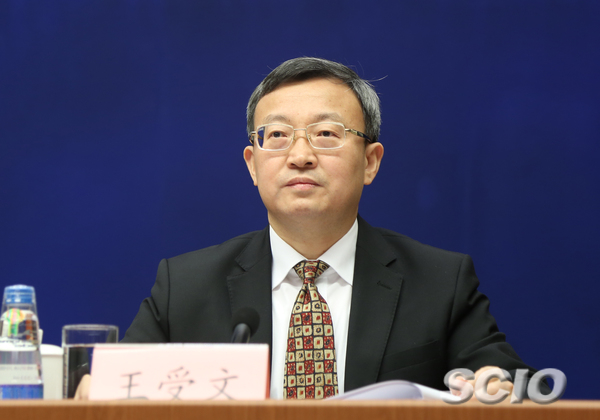
Wang Shouwen, the vice minister of Commerce and deputy China international trade representative, during the press conference, discusses a white paper on the Chinese government's position regarding trade frictions with the US. (Photo: CGTN / SCIO )
The Information Office of the State Council (SCIO) held a press conference to discuss the white paper on the Chinese government's position regarding trade frictions with the US.
It was published Monday to clarify the facts about China-US economic and trade relations, demonstrate its stance on trade friction with the US, and pursue reasonable solutions.
Representatives from the country's top planning agency, the intellectual property office, as well as the Chinese ministries of Commerce, Finance, and Industry and Information Technology, attended the press conference.
Fu Ziying, China international trade representative and vice minister of Commerce, stressed the importance of China-US trade relations to the global economy.
Fu noted that it is natural for the two countries to have differences considering they are at different stages of development but called for enhancing mutual trust and managing differences.
Fu warned, however, that while China does not want a trade war, it won't be afraid of one, as the US has pursued unilateralism, protectionism and restricted trade.
1. The claim of US 'losing' in trade relations with China 'groundless'
The US' claim of "losing" in trade relations with China is groundless and misleading and the two countries' trade cooperation is complementary because common interests far outweigh differences.
Fu pointed that the differences in factors including economic structures and the global division of labor all contributed to the trade deficit between the two countries, but China is willing to work hard to promote bilateral trade in a more balanced direction and hopes that the US can also show a positive attitude.
"The momentum of economic globalization is unchangeable, and the trend of China-US economic cooperation is irreversible," Fu said.
2. Could other countries benefit from China-US trade friction?
Wang Shouwen, the vice minister of Commerce and deputy China international trade representative, said China-US trade friction has already had an impact on certain US exporters as well as the trade potential with other countries.
"China is a very huge market and is willing to open up further. If there is no trade war, the Chinese market will provide opportunities for all suppliers," Wang said.
3. Can there be new-round of trade talks between China and the US?
Wang said the fate of a new round of trade talks between China and the US depends on the will of the US.
"Our (China's) door to resolve the friction through consultation and dialogue is open," Wang said.
Wang also condemned the US for "lacking sincerity and being untrustworthy" in the previous four rounds of talks despite they two sides reaching certain agreements, and even releasing a joint statement.
"To make it effective, the talks should also be based on mutual respect and treating each other as equals," Wang said. "It's difficult to proceed with the US posing tariffs like holding a knife to someone's throat."
4. Can China withstand the trade friction?
Lian Weiliang, the vice chairman of the National Development and Reform Commission, said China's economy is capable of cushioning the impact of sustained trade tensions.
Lian elaborated that in the face of trade challenges, China's overall economy is diverse and sturdy and it has the potential to meet domestic demands and increase the competitiveness of its market players.
"Generally speaking, China's economy has great resilience and potential. We are fully capable of damaging the impact of Sino-US trade frictions by expanding domestic demand and promoting high-quality development. We have the ability and confidence to conditionally promote the stability of China's economy."
5. Are China-US trade talks meaningless?
People pay the price in all forms of war, and war is not in line with the path of human development, Fu said at the press conference.
Fu added that both China and the US have seen improvements in terms of total economic volumes and people's well-being, despite all the differences and difficulties over the past 40 years since China and the US established diplomatic ties.
6. Do China's subsidy policies abide by WTO rules?
China's subsidy policies strictly comply with WTO rules and have not caused market distortion or unfair competition, Vice Minister of Finance Zou Jiayi said at Tuesday's press conference, adding that Beijing is continuously reforming and improving its subsidy policies.
"China has rigorously abided by its WTO commitments since its accession [to the group], and the countries' subsidies, regardless of the level or mode, have not exceeded the scope stipulated by the WTO," Zou said.
"But if some places have adopted prohibitive subsidies in practice, we will resolutely correct them once they are discovered."


